人教版(2019)选择性必修第三册Unit 2 Healthy Lifestyle Using Language 课件(共19张PPT,内嵌音频)
文档属性
| 名称 | 人教版(2019)选择性必修第三册Unit 2 Healthy Lifestyle Using Language 课件(共19张PPT,内嵌音频) |
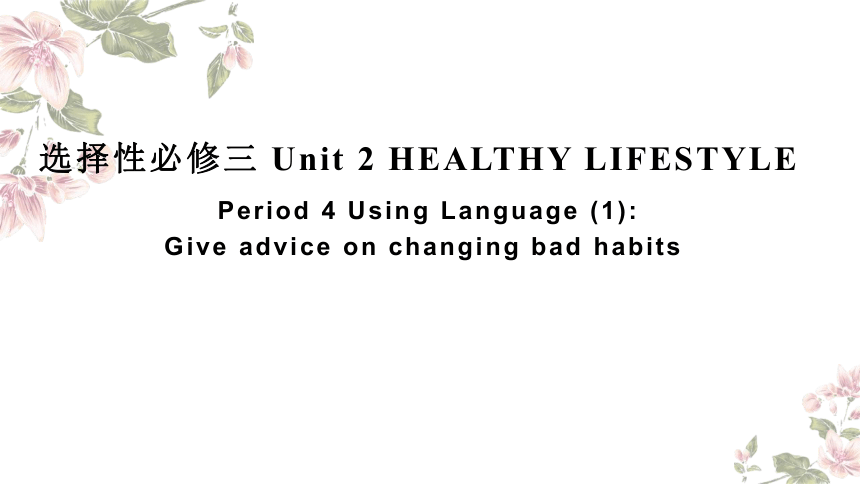
|
|
| 格式 | pptx | ||
| 文件大小 | 9.7MB | ||
| 资源类型 | 教案 | ||
| 版本资源 | 人教版(2019) | ||
| 科目 | 英语 | ||
| 更新时间 | 2024-07-15 17:06:43 | ||
图片预览

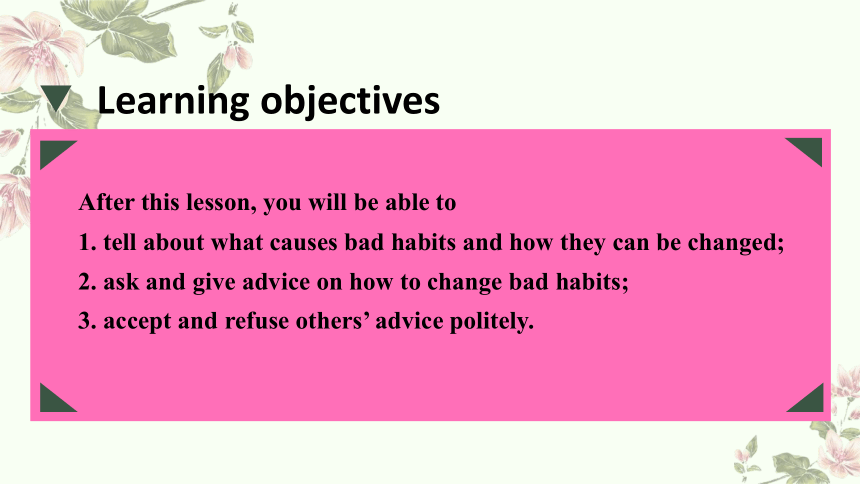
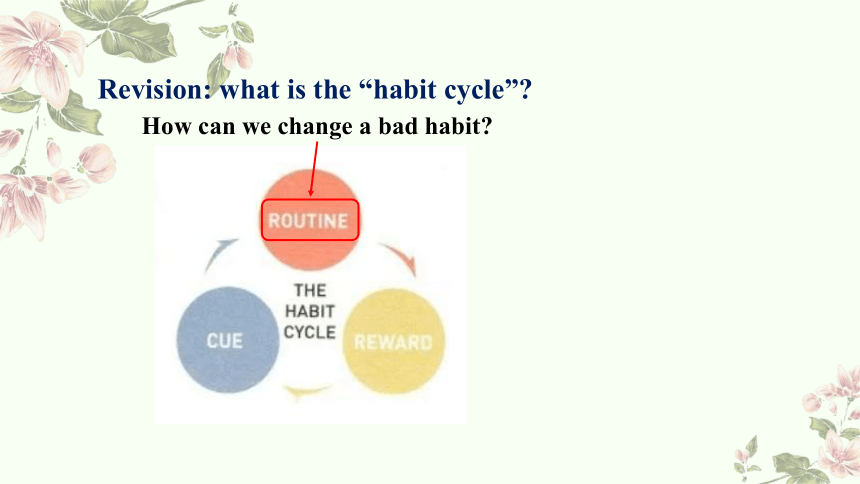
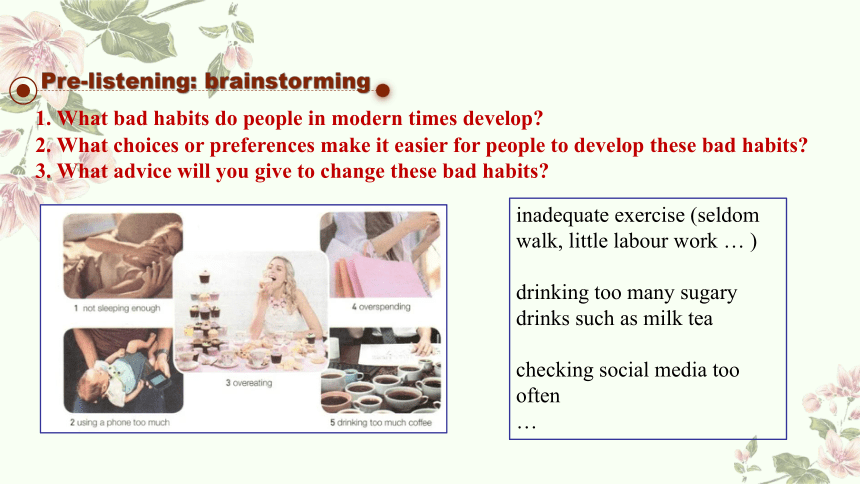
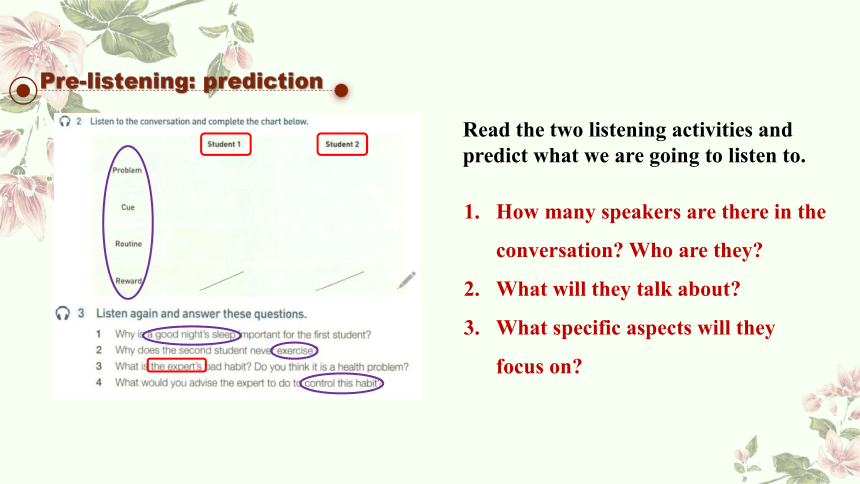
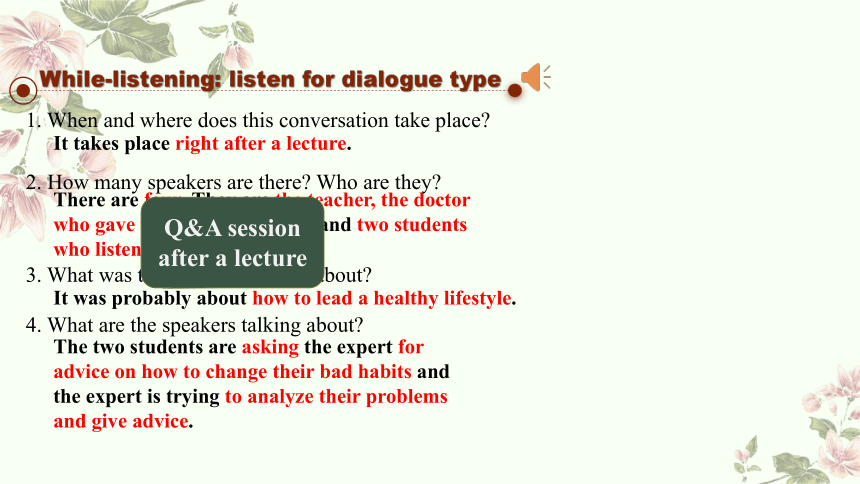

文档简介
(共19张PPT)
选择性必修三 Unit 2 HEALTHY LIFESTYLE
Period 4 Using Language (1):
Give advice on changing bad habits
Learning objectives
After this lesson, you will be able to
1. tell about what causes bad habits and how they can be changed;
2. ask and give advice on how to change bad habits;
3. accept and refuse others’ advice politely.
Revision: what is the “habit cycle”
How can we change a bad habit
Pre-listening: brainstorming
1. What bad habits do people in modern times develop
2. What choices or preferences make it easier for people to develop these bad habits
3. What advice will you give to change these bad habits
inadequate exercise (seldom walk, little labour work … )
drinking too many sugary drinks such as milk tea
checking social media too often
…
Pre-listening: prediction
Read the two listening activities and predict what we are going to listen to.
How many speakers are there in the conversation Who are they
What will they talk about
What specific aspects will they focus on
While-listening: listen for dialogue type
1. When and where does this conversation take place
2. How many speakers are there Who are they
3. What was the lecture probably about
It takes place right after a lecture.
There are four. They are the teacher, the doctor who gave the previous lecture and two students who listened to it.
It was probably about how to lead a healthy lifestyle.
The two students are asking the expert for advice on how to change their bad habits and the expert is trying to analyze their problems and give advice.
Q&A session after a lecture
4. What are the speakers talking about
While-listening: listen and complete the chart
Has trouble sleeping because of using the phone before going to sleep
Going to bed
Don’t keep the phone in the room so you won’t pick it up before bed
Feels depressed about being a little overweight
Finishing dinner
Walk outside for just 5 minutes
While-listening: answer these questions
1. Why is a good night’s sleep important for the first student
Because it will help with her schoolwork.
2. Why does the second student never exercise
Because he always picks up his phone instead of exercising.
3. What is the expert’s bad habit Do you think it is a health problem
He drinks too much coffee. It can be a health problem because too much coffee is bad for the heart and can cause headaches and other problems.
4. What would you advise the expert to do to control this habit
I would suggest that he change the habit slowly by drinking smaller cups of weaker coffee, and then try to change coffee for another drink such as tea and then water. Later he should do more exercise as this can stimulate the body like coffee does but has more positive benefits.
While-listening: text pattern
Read the tape script and work out the text pattern of this conversation.
Q&A session after a lecture
While-listening: expressions
While-listening: expressions
Asking for advice politely
Giving advice politely
While-listening: expressions
Accepting advice politely
Refusing advice politely
Post-listening: Have a conversation
Task:
Choose a bad habit from the picture and the table below or any bad habit;
Work out the habit cycle and think of ways to change it;
Have a conversation with your partner about it.
other bad habits
Post-listening: Have a conversation
chatting
of
Post-listening: Have a conversation
Post-listening: Have a conversation
A conversation by students
Summary
In this lesson, we have:
1. reviewed the habit cycle;
2. learned about how to change bad habits to healthier ones, esp. how to reduce stress;
3. learned to ask / give advice and accept / refuse others’ advice politely;
4. practised a conversation about advice on bad habits.
Homework
Suppose you are Li Hua. Recently, your friend Peter has gone abroad for further study. As a new exchange student there, he has to adapt himself to life there and catch up with others in study. He feels so stressed that he can’t go to sleep. He wrote an email to you to ask for advice. Please write a reply to him.
选择性必修三 Unit 2 HEALTHY LIFESTYLE
Period 4 Using Language (1):
Give advice on changing bad habits
Learning objectives
After this lesson, you will be able to
1. tell about what causes bad habits and how they can be changed;
2. ask and give advice on how to change bad habits;
3. accept and refuse others’ advice politely.
Revision: what is the “habit cycle”
How can we change a bad habit
Pre-listening: brainstorming
1. What bad habits do people in modern times develop
2. What choices or preferences make it easier for people to develop these bad habits
3. What advice will you give to change these bad habits
inadequate exercise (seldom walk, little labour work … )
drinking too many sugary drinks such as milk tea
checking social media too often
…
Pre-listening: prediction
Read the two listening activities and predict what we are going to listen to.
How many speakers are there in the conversation Who are they
What will they talk about
What specific aspects will they focus on
While-listening: listen for dialogue type
1. When and where does this conversation take place
2. How many speakers are there Who are they
3. What was the lecture probably about
It takes place right after a lecture.
There are four. They are the teacher, the doctor who gave the previous lecture and two students who listened to it.
It was probably about how to lead a healthy lifestyle.
The two students are asking the expert for advice on how to change their bad habits and the expert is trying to analyze their problems and give advice.
Q&A session after a lecture
4. What are the speakers talking about
While-listening: listen and complete the chart
Has trouble sleeping because of using the phone before going to sleep
Going to bed
Don’t keep the phone in the room so you won’t pick it up before bed
Feels depressed about being a little overweight
Finishing dinner
Walk outside for just 5 minutes
While-listening: answer these questions
1. Why is a good night’s sleep important for the first student
Because it will help with her schoolwork.
2. Why does the second student never exercise
Because he always picks up his phone instead of exercising.
3. What is the expert’s bad habit Do you think it is a health problem
He drinks too much coffee. It can be a health problem because too much coffee is bad for the heart and can cause headaches and other problems.
4. What would you advise the expert to do to control this habit
I would suggest that he change the habit slowly by drinking smaller cups of weaker coffee, and then try to change coffee for another drink such as tea and then water. Later he should do more exercise as this can stimulate the body like coffee does but has more positive benefits.
While-listening: text pattern
Read the tape script and work out the text pattern of this conversation.
Q&A session after a lecture
While-listening: expressions
While-listening: expressions
Asking for advice politely
Giving advice politely
While-listening: expressions
Accepting advice politely
Refusing advice politely
Post-listening: Have a conversation
Task:
Choose a bad habit from the picture and the table below or any bad habit;
Work out the habit cycle and think of ways to change it;
Have a conversation with your partner about it.
other bad habits
Post-listening: Have a conversation
chatting
of
Post-listening: Have a conversation
Post-listening: Have a conversation
A conversation by students
Summary
In this lesson, we have:
1. reviewed the habit cycle;
2. learned about how to change bad habits to healthier ones, esp. how to reduce stress;
3. learned to ask / give advice and accept / refuse others’ advice politely;
4. practised a conversation about advice on bad habits.
Homework
Suppose you are Li Hua. Recently, your friend Peter has gone abroad for further study. As a new exchange student there, he has to adapt himself to life there and catch up with others in study. He feels so stressed that he can’t go to sleep. He wrote an email to you to ask for advice. Please write a reply to him.
